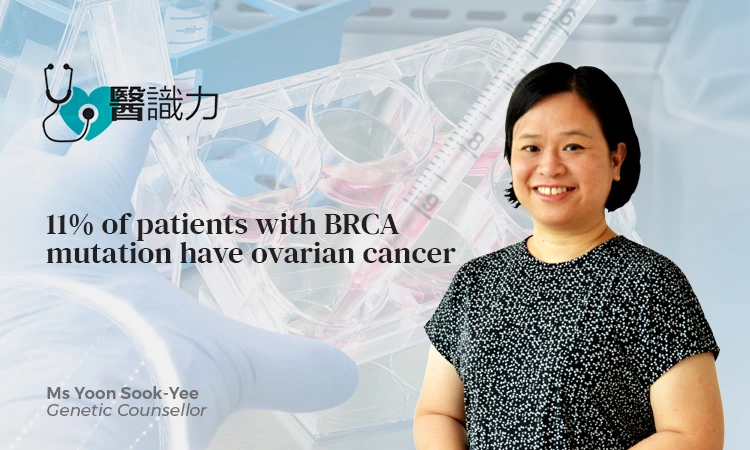Sinchew Daily – 10th March 2018
Article Summary:
11% of Patients With BRCA Mutation Have Ovarian Cancer

Case:
Ms. Chen, 45, a teacher, goes to the obstetrics and gynaecology department for routine check-ups every year. Recently, she felt abdominal distension and discomfort, her body was tired, and her waistline and weight continued to increase, so she took the initiative to undergo examinations, but she was unexpectedly diagnosed with ovarian cancer. When she was flustered about her condition and treatment plan, the doctor suggested that she take a BRCA gene test to find out whether she is a carrier of the BRCA mutation gene. After much deliberation, she decided to accept the test.
BRCA repairs DNA to help suppress cancer
BRCA 1 and BRCA 2, which are often mentioned, are genes that are directly related to hereditary breast and ovarian cancer.
Carriers of BRCA 1 or 2 mutations have a 65% chance of developing breast cancer by age 70. As for ovarian cancer, 40% of BRCA1 mutation carriers develop ovarian cancer at age 70, compared to 15% for BRCA2.
This means that out of a population of about 30 million in Malaysia, about 30,000 to 50,000 people will have BRCA mutations. However, fewer than 500 people learned that they were carriers of the BRCA mutation.
Know early and adopt appropriate risk management
We hope to test more ovarian cancer patients in China through the Mainstreaming Study (MaGiC) of BRCA 1 and BRCA 2 Gene Testing and Gene Counselling for Ovarian Cancer Patients in Malaysia.
Through MaGiC, patients can understand the cause of cancer, know early whether they are carriers of BRCA mutation genes, and take correct and appropriate risk management and treatment, or improve their survival rate through new treatments.
If genetic disease occurs, the mutation rate of consanguineous genes reaches 50%
If the patient inherits the BRCA mutation gene and develops the disease, the probability of the BRCA gene mutation in close relatives such as sisters is as high as 50%. This means that they have a relatively higher chance of developing cancer. We encourage close relatives of BRCA mutation carriers, such as mothers, sisters or cousins, to undergo genetic testing to find out if they are BRCA mutation carriers.
70 clinicians join to bring patients closer to genetic counselling
According to the general procedure, if a patient requests a genetic test, it must be referred to a genetic counsellor through the oncology department of the hospital for explanation of the genetic procedure, which can only be carried out after obtaining the patient’s consent. However, there is a serious shortage of genetic counsellors in our country, and most of them are concentrated in Kuala Lumpur area, making it difficult for patients to reach them.
Hope to recruit 800 ovarian cancer patients in 3 years
The results showed that of the 208 people who had completed the test, 27 (13%) were BRCA mutation carriers (positive), 33 (16%) had a mutation of uncertain clinical significance (VUS), and 148 were negative. The close relatives of two of the mutated gene carriers have taken the initiative to undergo a series of pre-tests.
The genetic team consultants will continue to follow up the cases of these mutant gene carriers and provide correct and necessary consultation services for the patients and their relatives.
After consultation by the oncology department, 80% of the patients were genetically tested
Preliminary findings showed that although the patients were not counselled by genetics specialists, they were highly trained clinicians, so patients were satisfied with the clinicians’ genetic testing and counselling services.
About 70% to 80% of patients choose genetic testing after consultation with an oncologist. But if an oncologist wants to refer a patient to a genetic counsellor, half of the patients will be reluctant to show up for an appointment.
3 questions about genetic testing
Q1: Which type of ovarian cancer is suitable for BRCA testing?
A: Patients with non-mucinous epithelial ovarian tumors, fallopian tube cancer and peritoneal cancer are suitable for testing.
Q2: Will BRCA genetic testing be expensive?
A: There is no charge for BRCA genetic testing in MaGiC research.
Q3: How will genetic testing of cancer patients affect insurance?
A: The insurance guidelines do not clearly state the relevant genetic testing items. If a patient applies for insurance after completing the test, they must declare in advance.











